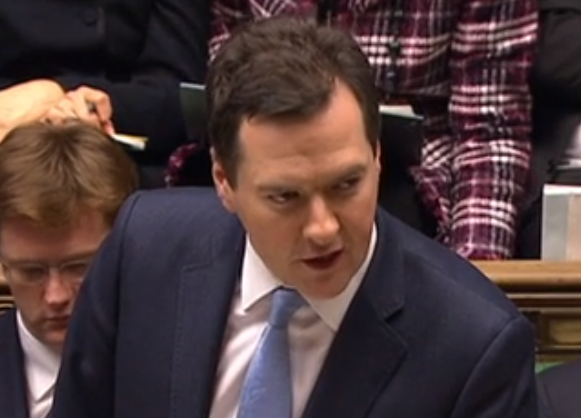George Osborne, Britain’s Chancellor of the Exchequer, promised support for shale gas extraction, low energy vehicles, and the creative industries, in the 2013 Budget today – but faced criticism as The Evening Standard leaked the details before he had started speaking.
Within a big picture of spending cuts, and promised tax cuts designed to reduce the budget deficit, there was little specifically about technology, and none of the infrastructure building measures, such as the broadband delivery programme announced in previous budgets. Even the much smaller subsidy on train Wi-Fi, which had been hinted at before the budget, did not feature in the speech.
But there were a couple of promises for green industries and a tax cut designed to encourage share trading.
 Bitter Tweet
Bitter Tweet
Many details of the budget were leaked before the Chancellor stood up to give his statement, including the prediction by the Office of Budget Responsibility that the economy will grow by 0.6 percent this year, and the reduction of beer duty by one pence. The Evening Standard tweeted its front page, headlined “Things Can Only Get Bitter”
Evening Standard editor Sarah Sands has apologised and one journalist has been suspended, but in 1947, leaking to an evening paper resulted in the resignation of the Chancellor Hugh Dalton.
In his speech, the Chancellor promised £1.6 billion to support specific sectors. With no other details yet, this appears to include high tech “creative” industries such as visual effects, which will get tax reliefs this year, he said.
“Creating a low carbon economy should be done in a way that creates jobs rather than costing them,” he said, promising tax relief on building low-emissions cars in this country. Two new carbon capture projects will go ahead, designed to remove greenhouse gases from generator emissions.
The ceramics industry will be given exemption from the Climate Change Levy, which will raise the hopes of the data centre industry which is hoping for a similar exemption to allow it to keep competitive with data centres abroad.
Energy costs may be kept down slightly, thanks to a “shale gas field allowance” which will make it easier to exploit shale gas by fracking – a process which has proved controversial, but is going ahead rapidly in the US.

Companies developing new technologies may be pleased with an increase in research and development credits to ten percent
Osborne also did a bit to promote investment, abolishing stamp duty on shares traded on high growth markets such as AIM.
“Britain is open for business” said Osborne, promising a cut in the rate of corporation tax from 21 percent to 20 percent in 2015 – making it ” the lowest business tax of any major economy in the world.”
Before presenting the budget, Osborne claimed success in bringing down Britain’s deficit “by one third” and derided the record of the previous Labour government.
The Office for Budget Responsibility is predicting growth of only 0.6 percent this but Osborne said this reduction was understandable in the context of a grim global economic situation, with Europe declining and US growth flat. He believes Britain will avoid a second quarter of decline: “All western nations live in very challenging times,” he said.

The government will still spend 0.7 percent on international aid as it had promised, he said.
The deficit is falling, but the government will miss its borrowing target, he said. The deficit was 11.2 percent of GDP forecast in 209-20110, and has declined by a third to a predicted 7.4 percent this year. Osborne also predicted the deficit would go down to 2.2 percent by 2017/2018.
Mixed reactions
Green industry experts felt Osborne’s support for shale gas was misplaced. “The Chancellor has prioritised increasing exports to the fast growing regions of the world but there is little support in the budget for green industries that have a strong foothold in these markets and a trade surplus of £5 billion,” said Andrew Raingold, executive director of the Aldersgate Group. “Rather than tax breaks for shale gas, the UK needs a clear regulatory framework that will drive investment and export opportunities for low carbon technologies.”
Commentators from the IT sector welcomed moves to support investment, but felt the budget said very little about boosting technology or tech skills.
“Two concrete things I was expecting and pleased to see have been addressed, are more support in stimulating jobs e.g. “Company NI holiday” and tax incentives on venture capital, R&D and patents for risk-taking entrepreneurs,” said Jan Quant, CEO and Founder of marketing software firm ScreenDragon. “We particularly liked the support from the government to encourage investment.”
“The Chancellor called this the budget for those who ‘work hard and get on’, and whilst there were several steps in the right direction, I was disappointed that technology was not singled out as an important, fast growth sector,” said Nic Scott, CEO of HR software maker Fairsail. “Employing people on minimum wage will give everyone a break under the Employment Allowance but we don’t need more burger flippers we need more code writers.”
“With the focus on reducing the deficit, Osborne must acknowledge that the technology industry could be an engine of growth during these tricky economic times,” said Simon Dennis, central government director at SAS UK. “Yet if we are to deliver on this potential the government needs to demonstrate that it is prepared to invest in the STEM skills needed.”
Today I’ll present a Budget that tackles the economy’s problems head on helping those who want to work hard & get on twitter.com/George_Osborne… — George Osborne (@George_Osborne) March 20, 2013
Can Tech City help Britain out of disaster? Try our quiz!

 Bitter Tweet
Bitter Tweet


